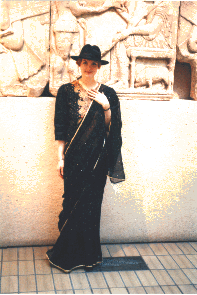EDITORIAL: Spinning a Web to Warwick

Sallie Goetsch in the British Museum
The past couple of months have seen a prodigious amount of ancient theater produced, as the reviews in this issue will testify. The past couple of weeks have been a crash-course in unix and hypertext markup language for your harried editor, who will soon be unable to converse in any language but technobabble.
The second development is in fact a response to the first, as Didaskalia moves to take advantage of the graphical interface and other presentational options offered by the World Wide Web. (See what I mean about technobabble?) In simpler terms, what this means is that from now on Didaskalia will be producing parallel versions: one in text-only (ASCII) format on gopher, just as we've always done, and one for access by Web-browsers such as NCSA Mosaic.
The World Wide Web is possibly the hottest thing on the internet, and becoming steadily more accessible; even those of you presently restricted to retrieving Didaskalia by ftp or asking for files by e-mail should be able to get onto it within the next year or so. The Web's great advantage, particularly to a publication devoted to theater, is its multimedia format. It can incorporate line art, photographs, digitalized sound recordings, video, and attractively formatted text. (And will soon allow us to transmit Greek characters.) WWW files are connected to one another through hypertext links: by clicking on highlighted text you can move back and forth between documents, making for easy cross-referencing.
One of the things which the graphical interface will permit is the publication of advertisments comparable to those produced in print journals. While many people claim that advertising on the internet is immoral, if not illegal, the true violation of Netiquette is deluging thousands of people with unwanted promotions. Most of us, after all, flock to the bookstalls at conferences: there are products we want to hear about. What we propose to establish is a set of reader-directed 'Promotions' pages on the WWW. No one will have to wade through pages of ads in order to read the features, but anyone interested will be able to shop virtually for goods and services related to ancient theater.
To make this work properly, we need your input. Tell us what kinds of products you're interested in. Books and educational videos are two which spring to mind, but there is a host of possibilities. What about presentation software? Or a monitor designed to transmit what's on your screen via an overhead projector, so that you can actually use something like Perseus in the classroom? Or sources of supplies for sets and costumes? If you've discovered something amazingly useful, let us know the manufacturer/distributor/retailer and we'll approach them about advertising. (If your own company manufactures/distributes/retails something which you think Didaskalia's readers are in dire need of, feel free to approach us about advertising.)
This is a resource which will build slowly over time as more companies recognize the advantages of doing business over the internet. Don't expect a 100-page catalogue of 'Everything You Ever Thought You Might Need to Produce Ancient Plays' immediately, but do watch this space for developments.
To reach Didaskalia using Mosaic, Cello, MacWeb, Netscape, or other Web-browsers, select 'Open URL' and enter http://www.didaskalia.net. This will take you to the Home Page, which will give you a range of options on where to go from there, including a set of guidelines for contributors and a brief description of the editor.
It is particularly appropriate that this technological development should take place with the (delayed) release of Issue 1.5. Our theme for this issue is 'Embodying Ancient Theater' and the WWW format helps us to do just that.
While the WWW version of Didaskalia will contain elements not representable in ASCII files, the informational content of both versions of the journal will be the same. The text of features, reviews, and listings will be identical in both formats.
The gopher/ftp version of Didaskalia has moved to the University of Warwick, and so has a new address: gopher.csv.warwick.ac.uk. This gopher works the same way the one at UTas does; once you connect to it, the method of retrieval should be the same. The ftp directories are now: ftp.csv.warwick.ac.uk/pub/journals/didaskalia/*.
There is a new editorial address for Didaskalia: didaskalia@csv.warwick.ac.uk. The previous editorial address (didaskalia-editor@classics.utas.edu.au) has been discontinued.
I would like to thank Ian Worthington for all the work he put into the first four issues of Didaskalia and the University of Tasmania Information Technology Services for allowing us to house those issues in their archives. I also owe an enormous debt of thanks to Denis Anthony of Warwick and Birmingham Universities, for arranging to put Didaskalia on the WWW and patiently answering my endless questions. The same goes for Ian Dickinson for his assistance with establishing the ftp and gopher versions of Didaskalia at Warwick. Thanks are due also to the entire Computing Services staff at Warwick for everything from sorting out my modem problems to providing me with access to a scanner.
This issue takes a look at some of the ways in which different people have brought ancient plays to life on the stage, from a site-specific Prometheus to the history of the Cambridge Greek Play to--you guessed it--ancient theater and computer technology.
Our next regular issue will appear in February and have as its theme 'New Ancient Theater,' which is to say original plays written according to Greek and Roman paradigms. Other themes for 1995 will include 'Roman Translations' and 'Ancient Stagecraft.' We also expect to produce several supplemental issues. All suggestions for features, themes, and supplements are welcome.
Sallie Goetsch
University of Warwick
